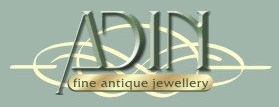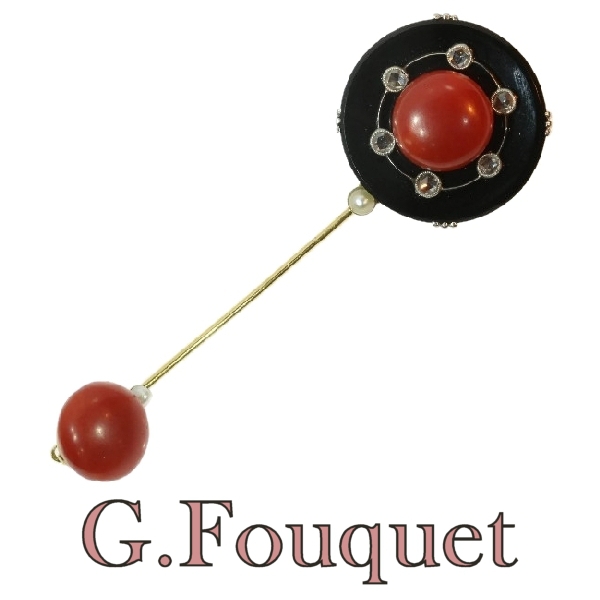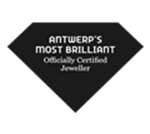We offer layaway, spread payments on the piece of your dreams. Ask us for details. Free insured shipping on all orders !!!
Strong design French Art Deco jabot pin signed G.Fouquet
Throughout this platinum and 18K yellow gold piece of timeless jewellery art from the 1930's by George Fouquet, the typical Art Deco circular design of this exclusive jabot pin expands as the waves of a cubistic pond of gems. A bold red coral bead is surrounded by six rose cut diamond encrusted in a platinum loop on a concave onyx disc above a pearl. An 18K yellow gold pin itself bridges to another pearl followed by a second coral bead, which completes this astounding fountain of youth.
From October 21st, 2013 till December 9th, 2013, this jewel was exhibited at the Art Deco exhibition organised by the Antwerp Diamond Museum in their Diamond Pavilion at the MAS. The MAS is an abbreviation for Museum aan de Stroom which translates to something like "Museum to the Flow". A new landmark building in Antwerp, a must-see when you are in Antwerp, city of diamonds! To see all our Art Deco jewelry that was at the museum's exhibition, click here.
Strong design French Art Deco jabot pin signed G.Fouquet.Biography of George Fouquet: George Fouquet (1862-1957) recognized as one of the very few and best known artist jewelers of his time, was the successor of his father Alphonse Fouquet. He joined the family business in 1891 and took over its direction at his father's retirement in 1895. He won many international awards and in circa 1902 he opened a new showroom in the Rue Royal, Paris. He worked closely together with artists of his time, like Alfons Mucha. He abandons the (in those days prevalent) floral motives in jewelry and aims for strong geometrical designs.
In 1929 Fouquet joined the Union des Artistes Modernes, commonly known as the UAM. They produced monumental pieces of jewelry. Prismatic designs of Cubist inspiration became the focal point of voluminous jewelry set with large semi-precious stones. Jewelry made by George Fouquet can be found in collections of many important museums all over the world; From the Victorian & Albert in London to The Metropolitan Museum of Art in New York. He bequeathed his archive and designs to the Musée des Arts Décoratifs in Paris
Antique jewelry object group: brooches
Country of origin: France
Style: Art Deco
- (styles overview)
Style specifics: Abstract motives and geometrical forms are quite typical for the Art Deco period.
Period: ca. 1925 (events and facts in 1925)
Source of inspiration: cubism
Material: platinum and 18K yellow
gold
- (precious metals)
Extra information:
A jabot-pin is a type of pin generally similar to a tie pin, worn on a jabot (a ruffle formerly worn by men on the front of a shirt or by women on the front of a dress).
Diamonds:
Six rose cut diamonds. We do not
have the weight of the diamonds which is normal in our trade when it comes to rose cuts.
Precious stones:
coral,
onyx and
seed pearl
- (precious stones)
Birthstones:
Diamond is the birthstone (or month
stone) for April,
onyx for
July
and pearl for
June.
- (general birthstones explanation)
Brand: G.Fouquet
Signature: G.Fouquet and its jewelry design reference number 16722 (see close-up picture)
Hallmarks: The French control mark for 18K gold representing
an eagle's head that was in use in France
from
about 1838.
- (general hallmarks info)
Condition: excellent condition
- (our condition scale)
Dimensions: Diameter big onyx circle approximately 3.00 cm (1.18 inch) and the total length is approximately 8.00 cm (3.15 inch)
Weight: 15.50 gram (9.97 dwt)
Reference Nº: 09146-4301
See also our:
art deco brooches,
art deco bar brooches,
art deco jewelry,
art deco stick pins
or our latest acquisitions,
antique jewelry,
estate jewelry,
vintage jewelry or
modern jewelry
Jewelry with birthstones (or month stones) for:
January -
February -
March -
April -
May -
June -
July
August -
September -
October -
November or
December.
Additional information:
jewelry glossary -
wall of fame -
visit us in Antwerp -
subscribe to our mailinglist.
What is antique jewelry? -
What is estate jewelry? -
What is vintage jewelry?




